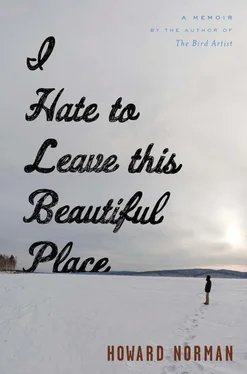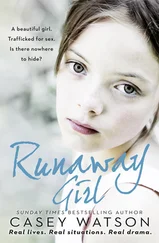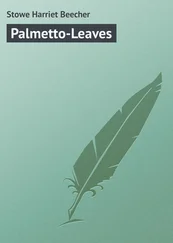As often as seven nights a week, I’d wait until my mother was asleep, the radio always on next to her bed (my mother was ever on the alert for tornado warnings; we had a tornado shelter, with a basement entry, stocked with cans of Campbell’s soup and two bottles of whiskey, and some nights my mother slept down there), then I’d drive the thirty or so blocks to Reeds Lake.
I had practically memorized the driver’s test manual and was careful to stay below the speed limit, hands at ten o’clock and two o’clock on the wheel, navigating the streets to the wealthy section of town. Some people had lakefront houses with wraparound porches and cabin cruisers moored in boat garages. One reason I went to the lake was to swim near the faux Mississippi paddle-wheel steamer, which, a decade earlier, had been the feature attraction of a popular amusement park, but now it was in shabby disrepair, in dry-dock on scaffolding, propped up a few feet out of the water, so on a windy day waves lapped at its hull. Most people I knew preferred to swim at public swimming pools, the more adventuresome ones in the Thornapple River.
On an exceedingly hot day during the last weeks of school the previous year, my best friend, Paul Amundson, and I played hooky, walked about three miles to the Thornapple, stripped down, and prepared to go for a swim in the shallows, mostly shrouded by enormous oak and willow trees, on a beautiful stretch of the river. When we stepped out from behind an oak, we heard laughter and playful shouting. We immediately got dressed and investigated, and to our astonishment discovered our English teacher, Kathy Woods, skinnydipping with her fiancé, whom she’d introduced to our after-school creative writing club. “Class,” she’d said, “I’d like you to meet my fiancé, Mr. Williams. He’s a policeman. But he’s extra-special and different, because he writes for newspapers, and he’s writing his own poetry, too. Don’t be afraid to ask questions just because a real writer is visiting, okay?
Behind the tree, Paul became a little panicky. “We have two choices. We can stay and watch, or we can get out of here fast.” I voted for staying. Paul said, “But what if I see something I can’t forget? What’ll I do then?” I could only come up with, “Just remember as much as you can for the rest of your life.” Paul started to walk away. He didn’t look back; I looked back, then ran and caught up with my friend. “What I think’s best,” Paul said, “is to give people their privacy.” I thought it was the most adult, dignified thing I’d ever heard.
The following Monday, an “exercise in description” was due in Miss Woods’s English class. I worked on mine for hours over the weekend, typing version after version on the Olivetti. On Tuesday before English class, the last period of the day, Miss Woods asked for a private conference. So I stayed after, and she said, “I want to speak with you about your three pages of description. First, let me point out that I only asked for two pages. You got a little carried away. That meant I had to read more of your writing than anyone else’s. But okay. All right. That’s not a crime, is it?
“The assignment was to provide a description of anything you wanted and to give what you write a lot of thought. And I think your writing is excellent. But I took note of a few things. Let me see here… Oh, yes, here on page two. Where you write how this teacher and this policeman — let me quote you—‘entwined their clothes in knots before they jumped into the river.’ Let’s examine this sentence. You really don’t need the word entwined to describe knots, do you? Knots are by definition entwined, aren’t they? Now, I won’t tell the principal you were skipping school. That would be hypocritical of me. Fine, then. Now that we have an understanding, I’ll trust you to keep my truancy to yourself — and I’ll do the same for you. Both of us will have to live with the fact that we skipped school on an unbearably hot day and ended up at the same swimming hole. Funny how life is. All right, you’re free to go now. By the way, I haven’t breathed a word about this to my fiancé. You remember he’s a policeman, right?”
As for Reeds Lake in the summertime, its nocturnal waters, moonlight, starlight, and especially the trumpeter swans ghosting along the hull of the paddle-wheel steamer, seldom failed to provide a reprieve from a fifteen-year-old’s operatic despairs. Also, I found it was a place where I could think things through. Not that I ever succeeded in thinking anything through to perfect clarity, or even usefulness, but I was aware of trying to. In essence I went to the lake to think. And to slip into the water and dog-paddle a few yards behind the swans, I suppose daring them to turn and unfold with startling velocity those S-curved necks and strike me with their beaks. That had happened only once, when I was caught unawares, daydreaming at night near the paddle wheeler, and a swan was right there and it was too late to swim away or dive underwater. For a week I had a bruise risen black-and-blue above my right eye. I might’ve been blinded by a swan, which would at least have been unique. Apart from that skirmish, I always had the rarest sense of a peaceful heart at Reeds Lake. Yet the most magical times for me were whenever enough gulls — they migrated from Lake Michigan — gathered on the paddle wheeler, so that the shifting weight of them would make the boat begin to turn, if only a foot or two at most. I always hated to leave that place. Every time, I hated to leave.
After studying North American Indian Waterfowl Traps, Weirs, and Snares for five or six nights in a row, I felt prepared to apply my one-book scholarship to the real thing. At a hardware store I purchased strips of balsa wood, framing wood, nails, twine, and a length of window screen for the trap’s walls (my use of the wire screen was cheating a little in authenticity). Water weeds, for camouflage, I found at Reeds Lake. There I was, waist-deep in the water at about two A.M., the lake misting, completing the construction of a trap. Given my limited carpentry skills, focus and intent were not enough; the result was less trap than contraption. Still, I situated it just beneath the paddle wheeler and fixed it to a splintered part of the hull with twine. When I first entered the water, ten or so mallards scooted off, honking in alarm. I placed “duck pellets” and bread crusts on a small platform inside the trap and retreated a dozen yards, sinking until I was neck-deep in water. From there I kept the trap under surveillance, vaguely aware of a pair of swans off to my left that appeared to be sleeping, heads tucked into back feathers, all exquisiteness in their moonlight repose.
Soon the mallards cautiously drew close to me. At such proximity, they were, in the intricacies of their plumage, surprisingly lovely. The expressiveness of their muttering, gargling, and quick nostril-fluting, the repertoire of coded signals, was hypnotic. I suppose I was lost in all of that when, quite suddenly, a swan reared back, water fantailing in moonlit droplets from its wings spread full width, then lurched forward, emitting a kind of choking hiss, hell-bent on destruction. In its approach the swan sent the mallards packing, then darted out its head directly into the trap, lifted it up, and finally wore it like a fencer’s protective mask. Caught like that, the swan went berserk, violently shaking its head and neck back and forth, attempting to disengage itself from the trap.
However much I was taking this all in, I hardly expected the swan to have the sheer strength to push the trap underwater in the direction of the paddle wheeler, and in a few moments I grew terrified because it hadn’t surfaced again. I didn’t know whether to wait it out or swim over and in some sort of adrenaline rush attempt to intervene — how would a person even do that with a swan? I should not have thought but acted, because all motion had stopped: the swan was now visibly floating, but drowned.
Читать дальше












